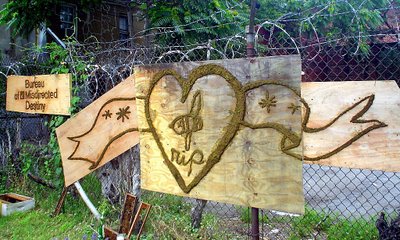
A Beelated Obeetuary
I have been on a hiatus now that the semester of teaching is underway. Rest assured, I’ve not neglected the bees, just the blog.
Below is an email from Sept. 16th to the Honey Co-Op members, to keep you loyal blog followers in the loop about our latest developments. There is still one hive going strong on the SIS roof at American University. Meanwhile I have applied for a Green Eagle Sustainability Fund grant to support renewed beekeeping efforts in the spring. More info on that in the near future.
Sept. 16, 2011
Dear Co-Op members –
I’m writing with some sad news. Our sweet, hard working friends, the honey co-op bee hives we once knew as Obeewan and Bee Arthur and the Golden Girls, have suffered a devastating blow, and most every girl from the hive and even the few boys, too, have gone to the great beeyond.
Lindsay and I checked them after Hurricane Irene and they had withstood the wind in really fine form. They had been struggling in a battle with the small hive beetles that loved to run in and out of their honeycomb. Their honey and nectar stores were not too swell at all after Irene, and we planned on giving both hives some greater attention, shifting frames and putting them on their bee syrup diet at that last check. But then came the 8 straight days of rain we had from Tropical Storm Lee. We checked the bees last Friday, once all that rain had passed, and lo, to our great sadness, the populations in both hives had plummeted. There were several crickets inside the hives, and the smell of bee death was strong.
Today we cleaned out the hives and collected some of the remaining bees from Obeewan to see if the researchers at U-MD had any clues for us as to if the bees fell to disease, or toxins, or pests. They will be doing the bee-tonomies this week. We theorized a bee-version of dysentery, or potentially nosema. Today researcher hypothesized that the bees actually starved – that their stores were low and their colonies already fragile, such that with the rain they couldn’t forage for their subsistence nectar as usual. Apparently he has been getting reports of this happening with some frequency in recent weeks, given our severe weather.
The good news is that there is still one thriving hive of bees on the SIS roof. These bees have a strong colony, and they don’t have any of the pest issues (small hive beetles, crickets, etc) that the honey co-op hives had. Since all of our hive boxes and frames are intact, and there is still a bit of budget cushion for the honey co-op, we will try again with more bees soon. stay tuned. I’m looking into sources for re-installing some bees. We won’t get honey this year, but as a beekeeper I am not going to give up, and I have faith that you co-op members will someday, eventually, get some honey out of all of this. Remember, your membership doesn’t have an expiration date!
I fully plan on continuing these bee-keeping pursuits, and share with you a few lessons learned:
1. Syrup is an essential, even if it attracts more pests to the hives, and we will feed them more regularly.
 |
| My lip got even a little bigger than this before the benadryl kicked in. |
2. We are going to look into greater IPM techniques to combat the small hive beetles and other pests that the bees face.
3. Sticky boards underneath the bottom boards may help deter hive intruders, as will entrance reducers.
I did get stung by a bee on my lower lip today as we were cleaning out the hives and collecting bees to donate to science. Maybe something symbolic in this that I should try to keep a stiff upper lip about the loss?
We shall overcome,
Eve

Comments are closed, but trackbacks and pingbacks are open.